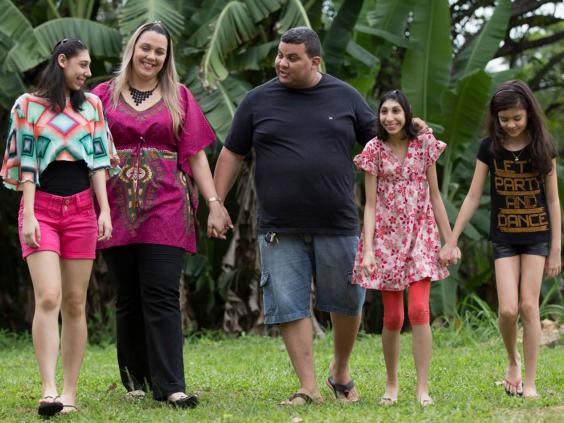
| Tracking the next pandemic: Avian Flu Talk |
Rio: 16 Young Adults in Serious con - 2 Paralyzed |
Post Reply 
|
| Author | |
Albert 
Admin 
Joined: April 24 2006 Status: Offline Points: 47746 |
 Post Options Post Options
 Thanks(0) Thanks(0)
 Quote Quote  Reply Reply
 Topic: Rio: 16 Young Adults in Serious con - 2 Paralyzed Topic: Rio: 16 Young Adults in Serious con - 2 ParalyzedPosted: February 08 2016 at 5:47am |
|
The headline I used doesn't match the article, but it's important to note. People need to understand that not all cases are mild and that people worldwide may experience the same.
Zika virus: Brazilians describe living under the shadow of the disease Zika virus: Brazilians describe living under the shadow of the diseaseAna Carolina Caceres is on her way out to meet friends. Holding her mobile phone at an angle just above her head, the Brazilian youngster takes a quick picture and checks how she looks in the photo before she dashes out of the house. Nothing unusual there. The 24-year-old is part of a generation of selfie-taking addicts. What is unusual is the spotlight in which Ms Caceres now finds herself. Brazil is battling to stem a sharp rise in the number of babies with microcephaly, a condition that means a smaller-than-normal head and likely brain developmental problems – something that Ms Caceres was born with. The attention of the world is trained on the microcephaly increase because of a suspected link with the Zika virus, which is currently spreading rapidly against the Americas and has the potential to spread further. The attention – from around Brazil and beyond – is bittersweet for Ms Caceres, whose parents were warned by doctors that their newborn’s skull’s 27.4cm circumference was “smaller than average and she would never walk or talk, and had a slim chance of survival”. An average newborn’s head is around 33cm. “But I’m still here and doing more than anyone predicted,” said Ms Caceres who graduated with a degree in journalism last year and has penned a book about her life. She says, while the suspected Zika link is awful, the publicity can only help those who have it in the longer term. “I’m heartbroken at how many children are being diagnosed with microcephaly, but at the same time... it’s all over the news,” she said.  Ana Cacares was born with microcephaly The World Health Organisation (WHO) last week declared an international emergency over the spike in cases of microcephaly and Guillain-Barré syndrome, a rare condition in which the immune system attacks the nerves, which is also linked with the Zika virus. Brazil recorded 404 babies born with microcephaly and 3,670 suspected cases in the past three months. From 2010 to 2014, an average of 156 Brazilian babies a year were born with the condition. For Ms Caceres, the condition has required a huge amount of medical attention. When she was nine days old, surgeons operated to remove 40 per cent of her skull in the frontal region, corrected a sunken forehead and a blocked nasal passage. She suffered two cardiac arrests on the operating table. After enduring five life-threatening surgeries to reshape and expand her skull and over a decade of breathing difficulties and seizures, Ms Caceres is proud of her normal size head. Her one limitation is to avoid falling over, as the brain mass in her forehead is protected only by skin. “I’ve been suffering on the side-lines all my life,” Ms Caceres said from Mato Grosso do Sul, in southern Brazil. “But now I’m able to tell millions of people that microcephaly is not the end of your world.” As well as looking to make sure the authorities care for at-risk pregnant women, and ensure thorough research is carried out into the virus to establish unequivocally a scientific link with microcephaly, Brazil’s government has ramped up operations to stamp out Zika and the Aedes aegypti mosquito which carries it. It is not just Brazil. The WHO has pledged millions of pounds to a global war against the proliferation of mosquitos and the spread of the virus as there are fears the virus could spread to parts of Africa, Asia, the US and even southern Europe. Scientists are in the throes of rushing through a vaccine, as there is no known cure. It will not be easy. The WHO’s warning to pregnant women to avoid travel to infected regions has been followed by daily headline-grabbing revelations. Brazil announced the first confirmed case of Zika virus transmitted by blood transfusion; the US reported the first case of a patient infected through sexual contact with someone who had travelled to a country where the virus is present; and on 5 February, 16 young adults in Rio de Janeiro were reported to be seriously ill, with two paralysed, after developing a severe form of Guillain-Barré syndrome. This weekend, with Brazil’s annual Mardi Gras street carnivals under way, virologists have warned of the possibility of a Zika contagion from urine, saliva and unprotected sex. Brazil has strict abortion laws, but abortion advocates are challenging that in Brazil’s Supreme Federal Court. However, Dr Debora Diniz, a professor of anthropology at the University of Brasilia, who is leading the campaign to change the law, said the case of Ms Caceres is distinctly different from the Zika-linked micro–cephaly cases happening now.  The Lima family, from left: Ana Vitoria, Viviane, Carlos, Maria Luiza and Julia (Bruno Kelly) “It would be wrong to compare foetuses affected by Zika with Ana [Caceres]. Her condition is genetically determined ... Our action in the Supreme Court would be to support the individual rights of women to choose whether to take a pregnancy to full term in the midst of an epidemic whose consequences are unclear.” The UN High Commissioner for Human Rights, Zeid Ra’ad Al-Hussein, has called on countries with cases of the Zika virus to ensure that woman have access to sexual health services that “include contraception maternal healthcare and safe abortion services”. UN and US health officials have accused Brazil – arguably because of its privacy laws – of not sharing enough samples and data to determine if Zika is actually behind the cases of microcephaly. “I have no faith in this government,” says Viviane Lima, 34, a Brazilian mother of three, with two girls born with microcephaly within the space of two years. “For the past 17 years, I have struggled to cope. Ministers are promising to support hundreds of women with healthcare and money, but we constantly have to rely on ourselves,” complained Ms Lima who lives in Manuas. Both girls, Ana Vitoria, 16 and Maria Luiza, 14, suffer from speech and cognitive problems. Ana Vitoria was born with a head circumference of 30.5cm and Maria Luiza’s measured 27.5cm. “I was 18 when I had Ana Vitoria and didn’t realise the full extent of what was ahead of me,” Ms Lima said. “Doctors told me both my children wouldn’t walk, talk or laugh. Today, Ana rollerskates and we are one big happy family on an amazing journey,” Ms Lima said. With her years of experience, Ms Lima has set up a Facebook support group called Mães de Anjos Unidas which has more than 300 members. Ms Lima’s husband Carlos, 34, stepfather to the two elder girls, knows the Zika virus is causing havoc to many, but he offered hope for those affected. “Love and patience have pulled us through and every day being father to my daughters is a fantastic experience,” he said. “One that’s changed me for the better.” http://www.independent.co.uk/news/world/americas/zika-virus-brazilians-describe-living-under-the-shadow-of-microcephaly-a6858446.html |
|
|
https://www.facebook.com/Avianflutalk
|
|
 |
|
Guests 
Guest Group 
|
 Post Options Post Options
 Thanks(0) Thanks(0)
 Quote Quote  Reply Reply
 Posted: February 08 2016 at 7:50am Posted: February 08 2016 at 7:50am |
|
Albert, I note from the article,
UN and US health officials have accused Brazil – arguably because of
its privacy laws – of not sharing enough samples and data to determine
if Zika is actually behind the cases of microcephaly. This is a common theme with H7N9 figures ect why would the BRICS want to share information with WHO or US, it's simply handing it over to the DRAGON KINGS it doesn't make sense.
I am very concerned about the longer term effect's yet to present themselves much like the Aids epidemic of the early 1980s Hopefully with Russia's help the affected countries can regain control of this dire situation. |
|
 |
|
Post Reply 
|
|
|
Tweet
|
| Forum Jump | Forum Permissions  You cannot post new topics in this forum You cannot reply to topics in this forum You cannot delete your posts in this forum You cannot edit your posts in this forum You cannot create polls in this forum You can vote in polls in this forum |